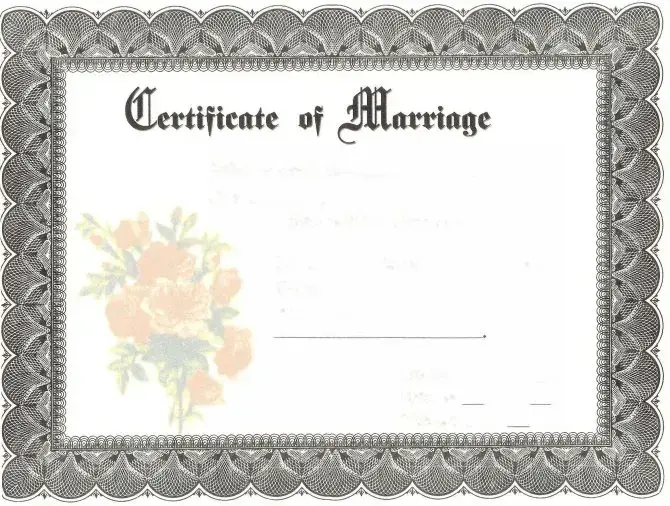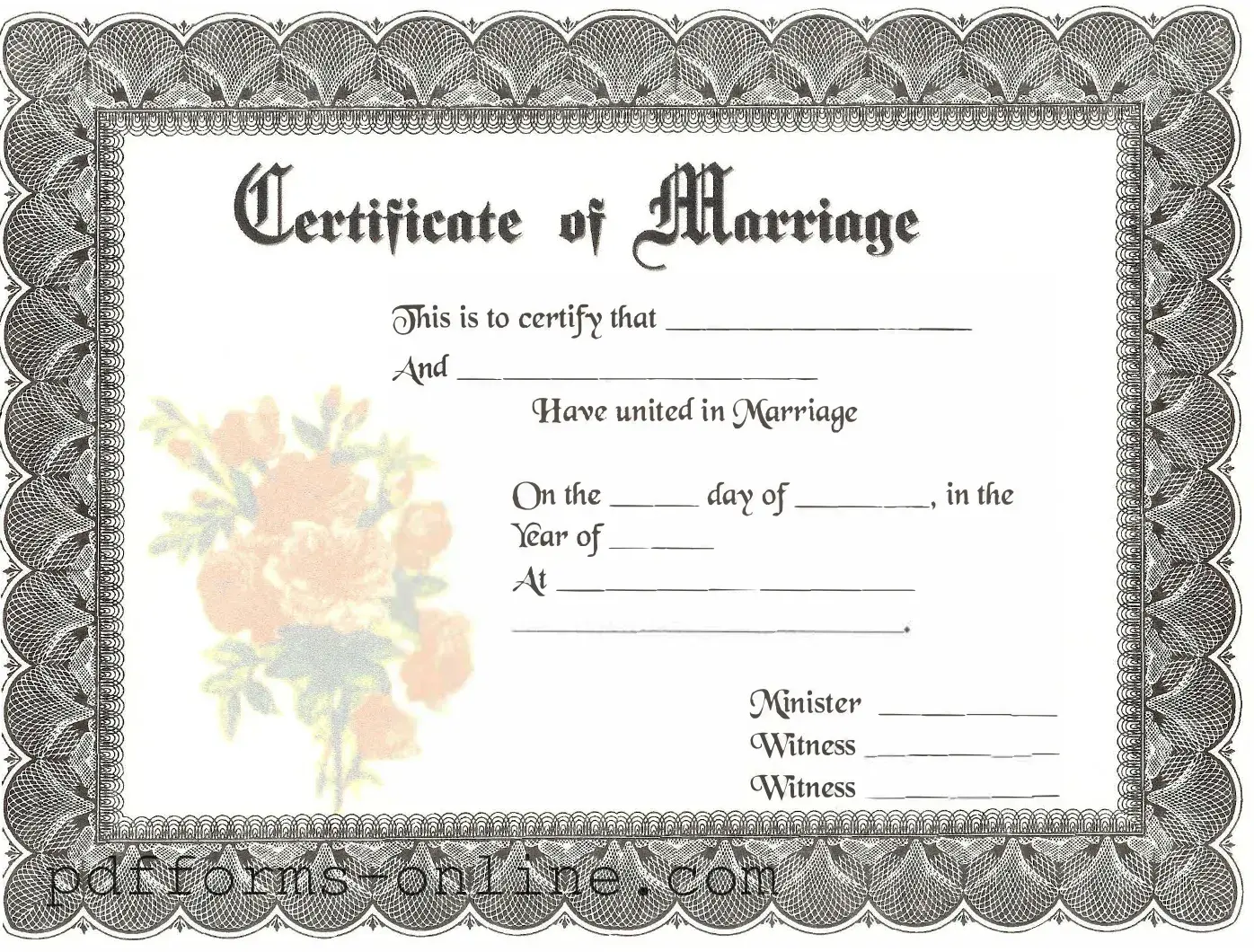Blank Marriage Certificate Template
The Marriage Certificate form is a crucial document that serves as official proof of a marriage between two individuals. This form typically requires essential details such as the full names of both parties, their dates of birth, and the date and location of the marriage ceremony. Additionally, the form may ask for information regarding the officiant who conducted the ceremony and the signatures of witnesses present at the event. It is important to note that the requirements for completing this form can vary by state, and understanding these variations is key to ensuring that the marriage is legally recognized. Furthermore, obtaining a marriage certificate often involves submitting the form to the appropriate governmental authority, along with any necessary fees. This document not only affirms the marital union but also plays a significant role in various legal matters, including name changes, spousal benefits, and inheritance rights. Thus, completing the Marriage Certificate form accurately and promptly is essential for couples embarking on their new life together.
Document Example

@Ji |
if |
|
|
is is to cert y tftat _______ |
|||
A_ |
|
|
|
nd ________ |
|||
|
� |
g |
|
|
СИаvс unitcd in |
|
|
|
rria c |
||
|
y |
f |
___, in tftc |
|
o |
||
|
Оп tftc __ da |
||
|
|||
� |
__ |
|
nistcr |
||
|
_ |
_ |
C\Vitness ___ |
_ |
|
C\Vitncss _____ |
||
Frequently Asked Questions
-
What is a Marriage Certificate?
A Marriage Certificate is an official document that confirms the marriage between two individuals. It serves as legal proof of the union and is often required for various purposes, including changing your name, applying for spousal benefits, and filing taxes together.
-
How do I obtain a Marriage Certificate?
To obtain a Marriage Certificate, you must first apply for a marriage license in your state or county. After the marriage ceremony, the officiant will complete the marriage license and submit it to the appropriate government office. You can then request a certified copy of the Marriage Certificate from that office, usually the county clerk or vital records office.
-
What information is typically required to complete the Marriage Certificate form?
The Marriage Certificate form usually requires the following information:
- Full names of both parties
- Date of marriage
- Location of the marriage ceremony
- Names of witnesses
- Signature of the officiant
Ensure that all information is accurate and complete to avoid delays in processing.
-
How long does it take to receive a Marriage Certificate?
The time frame for receiving a Marriage Certificate can vary by state and office. Generally, it can take anywhere from a few days to several weeks. It’s advisable to check with your local office for specific timelines. For urgent needs, some offices may offer expedited services for an additional fee.
Misconceptions
-
Misconception 1: A marriage certificate is the same as a marriage license.
Many people confuse these two documents. A marriage license is obtained before the wedding, granting permission to marry. The marriage certificate, on the other hand, is issued after the ceremony and serves as official proof of the marriage.
-
Misconception 2: You can get a marriage certificate anywhere.
Marriage certificates are typically issued by the state or county where the marriage took place. It’s important to check the specific requirements and processes for obtaining one in your location.
-
Misconception 3: You don't need a marriage certificate for legal purposes.
While some people believe that a marriage ceremony alone suffices, a marriage certificate is often necessary for legal matters such as changing your name, applying for spousal benefits, or filing taxes jointly.
-
Misconception 4: A marriage certificate is only needed for married couples.
In reality, a marriage certificate can be important for widowed or divorced individuals as well. It may be required for settling estates or proving marital status in legal situations.
-
Misconception 5: You can easily obtain a copy of your marriage certificate.
While it may seem straightforward, obtaining a copy often involves specific procedures. You may need to provide identification, pay a fee, and sometimes even prove your relationship to the parties involved.
-
Misconception 6: All marriage certificates look the same.
Different states and counties have their own designs and formats for marriage certificates. They may include varying information, security features, and even official seals.
-
Misconception 7: A marriage certificate is permanent and never needs to be updated.
This is not entirely true. If you change your name or if there are errors on the certificate, you may need to request an updated version. Keeping your records accurate is essential for future legal matters.
Common mistakes
-
Incorrect Personal Information: Many people fail to provide accurate names, dates of birth, or addresses. Double-checking this information is crucial to avoid delays.
-
Missing Signatures: Both parties must sign the form. Sometimes, one partner forgets to sign, which can lead to the application being rejected.
-
Failure to Provide Required Identification: Each state requires specific forms of identification. Not having the necessary documents can result in complications.
-
Not Understanding State Requirements: Each state has different rules regarding marriage certificates. It's essential to know what your state requires before submitting the form.
-
Submitting the Form Late: Some individuals overlook deadlines. Timely submission is important to ensure the marriage certificate is processed without issues.
Additional PDF Templates
Scrivener's Affidavit California - An affidavit designed to validate a scrivener's actions in the documentation process.
Lyft Inspection Form 2023 - Ensure that the gas and brake pedals are functioning smoothly.
Direction to Pay - Enables immediate processing of repairs once payment is authorized.
Document Data
| Fact Name | Description |
|---|---|
| Purpose | A marriage certificate serves as legal proof of a marriage between two individuals. |
| Issuing Authority | Marriage certificates are typically issued by the county clerk or a designated state agency. |
| Requirements | Both parties usually need to provide valid identification and may need to complete a marriage application form. |
| Waiting Period | Some states impose a waiting period between applying for a marriage license and the actual ceremony. |
| Fees | Fees for obtaining a marriage certificate vary by state and can range from $20 to $100. |
| Governing Laws | Each state has its own laws governing marriage certificates. For example, in California, the Family Code Section 500-600 applies. |
| Public Record | Marriage certificates are considered public records, meaning they can be accessed by the general public. |
| Amendments | If changes need to be made to a marriage certificate, a formal amendment process is required, often involving a fee. |
Similar forms
A birth certificate serves as a vital record that documents the birth of an individual. Like a marriage certificate, it is an official document issued by a government authority, typically a vital records office. Both documents are essential for establishing identity and legal status. They may be required for various legal processes, such as applying for a passport or enrolling in school. Just as a marriage certificate signifies the union of two individuals, a birth certificate signifies the beginning of a new life.
A divorce decree is another important document that shares similarities with a marriage certificate. It officially ends a marriage and is issued by a court. Both documents are pivotal in the realm of family law. While a marriage certificate validates the union of two people, a divorce decree confirms the dissolution of that union. Each document serves as a legal record that may be required for various administrative purposes, such as changing one’s name or remarrying.
A death certificate is a formal document that confirms the passing of an individual. Similar to a marriage certificate, it is issued by a government authority and serves as a legal record. Both documents play crucial roles in matters of estate planning and inheritance. A marriage certificate may be needed to claim benefits or inheritance rights, while a death certificate is often required to settle an estate. Each reflects significant life events and has legal implications.
An adoption decree is a legal document that finalizes the adoption of a child. Like a marriage certificate, it is a formal record that establishes a new legal relationship. Both documents are essential for confirming familial ties. An adoption decree provides the same legal standing as a birth certificate for the adopted child, while a marriage certificate can be necessary for legal matters involving family rights and responsibilities.
A Social Security card is a government-issued document that verifies an individual's identity and eligibility for benefits. While it serves a different function, it is similar to a marriage certificate in that both are essential for various legal and financial processes. A marriage certificate may be required to change one’s name on a Social Security card, thus linking the two documents in matters of identity and legal status.
A property deed is a legal document that signifies ownership of property. Like a marriage certificate, it is a formal record that can have significant legal implications. Both documents may be necessary for transactions involving property, such as buying or selling a home. A marriage certificate can affect property rights, particularly in community property states, where assets acquired during marriage may be jointly owned.
An employment record may include various documents that verify an individual's work history and qualifications. Similar to a marriage certificate, it serves as an official record that may be required for employment purposes. Both documents can play a role in establishing identity and legal status. A marriage certificate may be needed to confirm a name change, while employment records are crucial for job applications and background checks.
